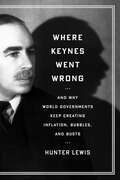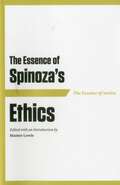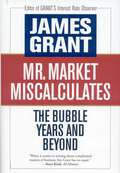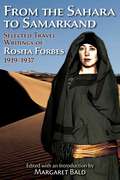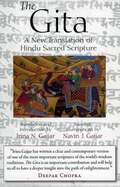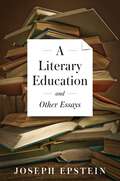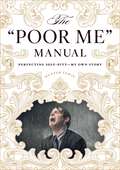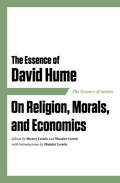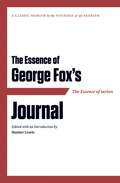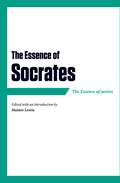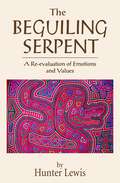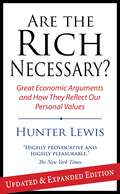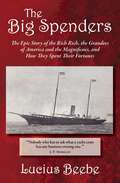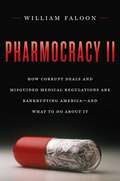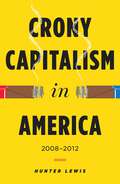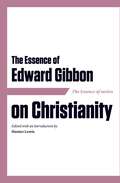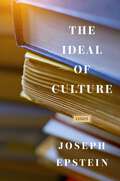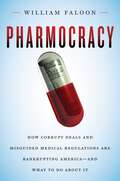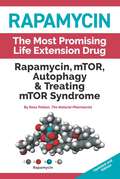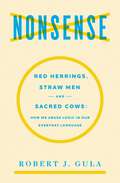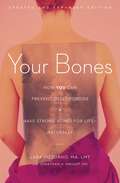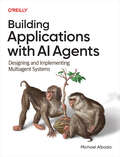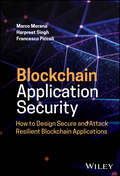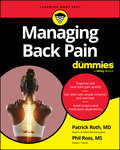- Table View
- List View
Where Keynes Went Wrong: And Why World Governments Keep Creating Inflation, Bubbles, and Busts
by Hunter LewisIn responding to the financial crash of 2008, both the Bush Administration and the Obama Administration have relied on prescriptions developed by John Maynard Keynes, the most important economist since Marx. But should we be relying on Keynes? What did Keynes actually say? Did he make his case? Hunter Lewis concludes that he did not. If Keynes was wrong then so are the economic policies of virtually all world governments today.Now with linked endnotes and index.
Your Stomach: What is Really Making You Miserable and What to Do About It
by Jonathan V. Wright M.D.Most Americans suffer stomach problems. Many lead lives of utter misery. Whether you call it heartburn or acid reflux, this painful affliction is also associated with throat cancer. Shockingly, the problem may not be too much stomach acid, but too little! And antacids and acid blockers may actually be making the problem worse. This powerful little book offers solid scientific information about one of the most common and distressing ailments in America. There is also fascinating information about little-used all-natural supplements. Now with linking index and endnotes.
The Essence of Spinoza's Ethics
by Hunter LewisAxios&’s Essence of . . . Series takes the greatest works of practical philosophy and pares them down to their essence. Selected passages flow together to create a seamless work that will capture your interest from page one.Goethe: " [In his] Ethics ... , I found the serenity to calm my passions...."This new edition makes Spinoza's own words understandable by everyone.Now with linking index.
Mr. Market Miscalculates: The Bubble Years and Beyond
by James GrantWhy is America in financial crisis today? This book, better than any to date, explains it all-how we got here and where we are going. The how we got here is brilliantly described in a collection of pieces from Grant's Interest Rate Observer, the Wall Street insider's Bible. The where we are going is treated in Jim Grant's up-to-the-minute introduction. No fan of Greenspan or Bernanke, Grant tells the unvarnished truth about America.
From the Sahara to Samarkand: Selected Travel Writings of Rosita Forbes 1919-1937
by Rosita ForbesThe extraordinary Rosita Forbes explored the Libyan desert, sailed across the Red Sea, and trekked more than a thousand miles into remote Abyssinia. She wrote some thirty books about these and other journeys, as well as biographies, histories, novels, and memoirs. She was a widely published journalist and commentator on international affairs, a popular lecturer, and a documentary filmmaker. Her story deserves to be retold and her writing discovered by a new generation.
The Gita: A New Translation of Hindu Sacred Scripture
by Irina N GajjarThe Bhagavad Gita is a treasure of world religious, philosophical, and ethical literature. Part of the larger Mahabharata cycle, it is the most famous part of that great Indian epic.This book was Gandhi's personal bible. His life exemplified its ideal of spiritual detachment in the very midst of intense conflict and action. The Gita was also a favorite text of Thoreau, Emerson, and T.S. Eliot.
Literary Education and Other Essays
by Joseph EpsteinWho invented the personal essay? That is hard to say. The ancient Roman philosopher and cynical power broker, Seneca? The 16th century French philosopher Montaigne certainly brought it to a peak of perfection. There were many 19th century masters, not so many after that. Who is the greatest living essayist writing in English? That requires no debate at all. It is unquestionably Joseph Epstein. He is not only the best living essayist; he is right up there in the company of Seneca and Montaigne, but one of our own, living in our era and dealing with our pleasures and travails. Epstein is penetrating. He is witty. He has a magic touch with words, that hard to define but immediately recognizable quality called style. Above all, he is impossible to put down. Epstein reads omnivorously and brings us the best of what he reads, passages that we would never have found on our own. How easy it is today, in the digital age, drowning in emails and other ephemera, to forget the simple delight of reading for no intended purpose. Like any master essayist, however, this one brings us more than the shared experience of a lifetime of reading. He brings us himself, alternately scolding and charming, sparkling and deep, buoyant and sad, zany and wise, rebellious and conservative, bookworm and sports fan, clever and everyman, debunker and preservationist, deep into high culture, deep into low culture, curious, fresh, and settled in his ways. This is the friend we all wish we could have, the ideal, humane companion who is completely comfortable in his own human skin. Like Plutarch, he gives us life teaching by example, but with a wry smile and such a sure hand that we hardly notice the instruction. It is pure pleasure.
The "Poor Me" Manual: Perfecting Self Pity—My Own Story
by Hunter LewisThis book begins with the following author's note:"One crisp sunny morning I was surprised to find a package left at my front door containing this book in manuscript form. Its author included a note saying that his last name was Lewis, that he had seen a book of mine, and that he had decided to adopt my name as his own. In addition, he expected me to publish his (our) book and that the cover should be "nice." I have tried to do as requested."What follows this note is a rollicking fictional memoir that takes us through the ups and downs of the mysterious author's life. And what a life it is, full to the brim with every imaginable kind of neurotic behavior. There is method to this madness. In earlier books, including the best-selling A Question of Values and its sequel The Beguiling Serpent, Lewis developed a unique theory of the emotions. The " Poor Me" Manual further develops the theory and brings it to vivid life. This is fun reading. You will often laugh out loud. But you will also learn a great deal about the emotions and about which emotional strategies work and which don't.This book would be a great gift for anybody, but especially the teenager in your life.Now with linked endnotes and index.
The Essence of David Hume: On Religion, Morals, and Economics
by Henry Lewis, Hunter LewisAxios's Essence of . . . Series takes the greatest works of practical philosophy and pares them down to their essence. Selected passages flow together to create a seamless work that will capture your interest from page one.This newest volume in the series is dedicated to David Hume who is ranked as one of the greatest Western philosophers and economists. You will find three main sections on Hume (Religion, Morals, and Economics) as well as a section on his life.
The Essence of . . . George Fox's Journal
by Hunter LewisAxios&’s Essence of … Series takes the greatest works of practical philosophy and pares them down to their essence. Selected passages flow together to create a seamless work that will capture your interest from page one.George Fox founded The Religious Society of Friends, better known as Quakers, a form of Christianity which has had an immense influence throughout the world. The story contained in his journal is gripping and hard to put down.Now with linking endnotes and index.
The Essence of Socrates
by Hunter LewisSocrates is important to us for many reasons. First, he recognized the value of logic and showed us how to use it to discover truth. Second, he led an exemplary and courageous life which cannot fail to inspire anyone who reads about it. His calm and eloquent defense of himself during the final trial for heresy, which ended in his condemnation and execution, are among the most famous passages in world literature. No one, apart from the great religious teachers, has had a more profound impact on human thought. Socrates himself wrote nothing. Fortunately his pupils Plato and Xenophon recorded his sayings for posterity. Indeed the connection between Socrates and Plato is so close that this little book could alternatively been titled The Essence of Plato. The latter&’s philosophical treatises did not survive, so that all that remains to us is the Dialogues which mostly recount the life of Socrates.Axios Press&’s Essence of . . . series takes the greatest works ever written in the field of practical philosophy and pares them down to their essence. We select the best passages—the ones that are immediately relevant to us today, full of timeless wisdom and advice about the world and how best to live our lives—and leave behind the more obscure or less important bits. Our selections are not isolated: they flow together to create a seamless work that will capture your interest and attention from page one. And we provide useful notes and a solid introduction to the work.
The Beguiling Serpent: A Re-evaluation of Emotions and Values
by Hunter LewisThe Beguiling Serpent looks at emotions and emotional values in particular. On one level a sequel to A Question of Values, it is also an excellent introduction to emotions and values, and ideal course material.
Are the Rich Necessary: Great Economic Arguments and How They Reflect Our Personal Values
by Hunter LewisThis updated and expanded edition of Are the Rich Necessary? is an ideal introduction to economics at a time when economics is on everyone's mind. Lewis is always objective, fair, and fun to read. Rich is also an ideal adjunct to an economics textbook. The New York Times called this book both highly provocative and highly pleasurable.Now with linking endnotes and index.
The Big Spenders: The Epic Story of the Rich Rich, the Grandees of America and the Magnificoes, and How They Spent Their Fortunes
by Lucius BeebeThe Big Spenders was Lucius Beebe's last and many think his best book. In it he describes the consumption of the Gilded Age. Beebe enjoys it all immensely, and so do we his readers, whether it is James Gordon Bennett buying a Monte Carlo restaurant because he was refused a seat by the window, or Spencer Penrose leaving a bedside memo reminding himself not to spend more than $1 million the next day.
Pharmocracy II: How Corrupt Deals and Misguided Medical Regulations Are Bankrupting America--and What to do About It
by William FaloonOur healthcare system is irretrievably broken, and now it is devastating the US financially. Pharmocracy II, like its predecessor, Pharmocracy, uncovers egregious FDA incompetence, abuse, and corruption. This is an agency that is serving its corporate &“clients,&” the big drug companies, not the public. This book also shows how information about natural therapies from food and other natural sources is censored to support drug company profits. Over-regulation causes lifesaving medications to be delayed or suppressed altogether, and makes consumers pay inflated prices for FDA-approved therapies that are only minimally effective and often dangerous.A reform of this crony capitalist healthcare system, Faloon argues, would spare Medicare and Medicaid from insolvency, allow small businesses to start hiring and giving raises again, and significantly improve the health of the American public.Pharmocracy II presents factual evidence and irrefutable logic to support a complete overhaul of today&’s broken healthcare system. It lays out a plan of what to do and how to do it. If the plan is followed, it will not only vastly improve American health. It will rescue the American economy.Since 1980, William Faloon and the nonprofit Life Extension Foundation® have published articles exposing what is rotten, advocating what is good, and promoting innovation in American healthcare. No one is more qualified to lead us forward out of today&’s healthcare disaster.
Crony Capitalism in America: 2008-2012
by Hunter LewisWe see it everywhere:• shady zoning regulations in a small town;• taxpayer money diverted into political campaigns;• deals that enrich the few at the expense of the many;• billion-dollar bailouts;• trillions of newly printed dollars flowing from government to Wall Street at giveaway interest rates; • brand-name economists hired to defend the indefensible with a smokescreen of economic theory.When private interests need a political favor, they know whom to call. When politicians need money, they also know whom to call. The people involved try to keep most of it concealed behind closed doors.This is the system that prevails in Russia after the fall of Communism. But increasingly it is America's system as well.Many people regard Wall Street as the epicenter of American capitalism. In reality it is the epicenter of American crony capitalism. Where Wall Street stops and Washington begins is impossible to say. This situation was not caused, as many suppose, by the Crash of 2008. Rather the Crash was caused by the longstanding Wall Street–Washington partnership. But the problem extends far beyond Wall Street to every corner of America.If we are going to do anything about our present economic problems, and also give the poor a chance at a better life, we will need to eliminate crony capitalism.Although full of hair-raising stories, this book is also about solutions. It tells us in clear and simple terms what is wrong and what needs to be done about it.
The Essence of Edward Gibbon on Christianity
by Hunter LewisEdward Gibbon (1737–1794) personifies the calm and dignified rationalism of the 18th century. He became world famous as the author of the Decline and Fall of the Roman Empire, a multi-volume work describing almost 1300 years of history in some of the finest English prose ever written. The present volume is taken from volume one and focuses entirely on the early Christian Church. Gibbon does not mince words. He likes the religious toleration that prevailed in the Roman Empire prior to Christianity and describes it in his characteristically witty way: &“The various modes of worship which prevailed in the Roman world, were all considered by the people, as equally true; by the philosopher, as equally false; and by the magistrate, as equally useful.&” He further outraged orthodox believers of his time by saying that his entire work described &“the triumph of barbarism and religion.&”Axios Press&’s Essence of . . . series takes the greatest works ever written in the field of practical philosophy and pares them down to their essence. We select the best passages—the ones that are immediately relevant to us today, full of timeless wisdom and advice about the world and how best to live our lives—and leave behind the more obscure or less important bits. Our selections are not isolated: they flow together to create a seamless work that will capture your interest and attention from page one. And we provide useful notes and a solid introduction to the work.
The Ideal of Culture: Essays
by Joseph EpsteinWho is the greatest living essayist writing in English? Joseph Epstein would surely be at the top of anybody&’s list. Epstein is penetrating. He is witty. He has a magic touch with words, that hard to define but immediately recognizable quality called style. Above all, he is impossible to put down.Joseph Epstein&’s The Ideal of Culture: Essays is the fourth such volume from Axios Press and contains 63 essays. Subjects range from domestic life to current social trends to an appraisal of &“contemporary nuttiness.&” It follows the much acclaimed Essays in Biography, 2012, A Literary Education and Other Essays, 2014, and Wind Sprints: Shorter Essays, 2016.After reading Epstein, we see life with a fresh eye. We also see ourselves a little more clearly. This is what Plutarch intended: life teaching by example, but with a wry smile and such a sure hand that we hardly notice the instruction. It is just pure pleasure.
Pharmocracy: How Corrupt Deals and Misguided Medical Regulations Are Bankrupting America--and What to Do About It
by William FaloonOur healthcare system is irretrievably broken, and now it is devastating the US financially. Pharmocracy uncovers egregious FDA incompetence and abuse, and shows how over-regulation causes lifesaving medications to be delayed or suppressed altogether, and makes consumers pay inflated prices for FDA-approved therapies that are only minimally effective and often dangerous. A free market approach to healthcare, Faloon argues, would spare Medicare and Medicaid from insolvency, while significantly improving the health of the American public.
Rapamycin: mTOR, Autophagy and Treating mTOR Syndrome
by Ross PeltonRapamycin is the most promising life extension drug ever discovered.mTOR and autophagy are a breakthrough in our understanding of aging.Rapamaycin helps re-balance the mTOR/autophagy ratio to delay the onset of age-related diseases.Rapamycin, mTOR, Autophagy & Treating mTOR SyndromeUpdated 2nd Edition is a book about how to successfully increase healthspan and lifespan.
Nonsense
by Robert J. GulaNonsense is the best compilation and study of verbal logical fallacies available anywhere. It is a handbook of the myriad ways we go about being illogical—how we deceive others and ourselves, how we think and argue in ways that are disorderly, disorganized, or irrelevant. Nonsense is also a short course in nonmathematical logical thinking, especially important for students of philosophy and economics. A book of remarkable scholarship, Nonsense is unexpectedly relaxed, informal, and accessible.
Your Bones: How You Can Prevent Osteoporosis and Have Strong Bones for Life—Naturally
by Lara PizzornoYour Bones contains everything you need to know for healthy bones in one book, providing scientifically based advice which highlights natural prevention and treatment strategies. This UPDATED AND EXPANDED edition includes many new studies on the dangers of the bisphosphonate drugs and an in depth discussion of two new drugs with potential adverse effects. Also new: more information on bone-busting patent medicines, calcium supplementation options, strontium, vitamin K2, and zinc as well as a section on bone-building exercise.
Building Applications with AI Agents: Designing and Implementing Multiagent Systems
by Michael AlbadaGenerative AI has revolutionized how organizations tackle problems, accelerating the journey from concept to prototype to solution. As the models become increasingly capable, we have witnessed a new design pattern emerge: AI agents. By combining tools, knowledge, memory, and learning with advanced foundation models, we can now sequence multiple model inferences together to solve ambiguous and difficult problems. From coding agents to research agents to analyst agents and more, we've already seen agents accelerate teams and organizations. While these agents enhance efficiency, they often require extensive planning, drafting, and revising to complete complex tasks, and deploying them remains a challenge for many organizations, especially as technology and research rapidly develops. This book is your indispensable guide through this intricate and fast-moving landscape. Author Michael Albada provides a practical and research-based approach to designing and implementing single- and multiagent systems. It simplifies the complexities and equips you with the tools to move from concept to solution efficiently. Understand the distinct features of foundation model-enabled AI agents Discover the core components and design principles of AI agents Explore design trade-offs and implement effective multiagent systems Design and deploy tailored AI solutions, enhancing efficiency and innovation in your field
Blockchain Application Security: How to Design Secure and Attack Resilient Blockchain Applications
by Harpreet Singh Marco Morana Francesco PiccoliLearn to secure, design, implement, and test tomorrow’s blockchain applications. Blockchain Application Security guides readers through the architecture and components of blockchain, including protocols such as Bitcoin and beyond, by offering a technical yet accessible introduction. This resource is ideal for application architects, software developers, security auditors, and vulnerability testers working on enterprise blockchain solutions. It bridges the gap between theory and implementation, providing actionable guidance on protecting decentralized systems while capitalizing on their innovative benefits. Blockchain Application Security covers the essentials, from the fundamentals of distributed ledgers, consensus algorithms, digital wallets, smart contracts, privacy controls, and DIDs, to designing secure dApp architectures with component-level threat analysis and resilient APIs, token transactions, digital exchanges, and identity models. It features a complete lifecycle example for securing a DeFi lending and borrowing platform, along with practical walkthroughs for smart contract development, AWS-integrated blockchain systems, frontend/API integration, and code auditing. “An accessible, comprehensive blockchain overview that emphasizes its value across industrial and government sectors with a holistic security focus.” —David W. Kravitz, Technical Advisor, Spring Labs “A cutting-edge method for securing blockchain applications, pushing the boundaries of current practice.” —David Cervigni, Senior Security Research Engineer at R3 “Bridging theory and practice with realistic examples, this guide empowers architects and developers to build attack-resistant applications.” —Steven Wierckx, Product Security Team Lead & Threatmodel Trainer at Toreon “A valuable resource for blockchain specialists, featuring hands-on examples of deploying dApps on AWS and securing infrastructure.” —Ihor Sasovets, Lead Security Engineer, Penetration Tester at TechMagic “A practical roadmap for navigating blockchain security that we recommend to clients and incorporate into our training.” —Vijay Dhanasekaran, Founder & Chief Blockchain Officer, Consultant at Blocknetics “An indispensable resource for dApp developers, guiding readers from fundamentals to advanced implementation with in-depth vulnerability analysis.” —Mohd Mehdi, Head of DevOps, DevSecOps and Infrastructure at InfStones
Managing Back Pain For Dummies
by Pat Roth MD Phil Ross MSDiscover countless options for rest and relief when you have chronic back pain You're probably not thrilled that you need a book called Managing Back Pain For Dummies, but you'll be thrilled that you bought it. Written by a neurosurgeon and a master personal trainer, this book contains expert advice that will help you feel better. You'll get step-by-step guidance on how to lessen your pain and reduce reliance on medication, using self-treatments and exercises that really work. You'll also learn about the clinical treatments that are available to treat back pain—and when it's time to seek a doctor's help. Back pain is different for everyone. You might benefit from simple posture fixes and at-home exercises, or you might be ready to pursue injections, nerve blocks, and other medical treatments. Wherever you are on the back pain spectrum, this helpful Dummies guide will help move the needle toward relief. Prevent and reduce back pain by improving your posture and technique during daily activities like yard work Understand the latest professional treatments and self-treatments, and know when to see an MD Reduce your reliance on medication by exploring our methods of stimulating self-healing and permit the body to heal itself. Follow clear, concise, illustrated exercise routines designed to strengthen your core and support muscles of the spine. This book is for the millions of people who are struggling with back pain and looking for non-surgical options to improve their quality of life.
